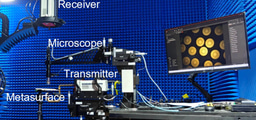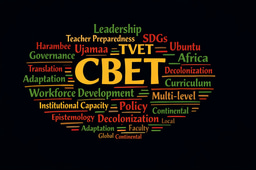Impact of educational intervention on knowledge of antimicrobial resistance and antibiotic use patterns among healthcare students: a pre- and post-intervention study
Published in Microbiology
Methods
A quasi-experimental pre-and-post study design was conducted with unpaired groups of healthcare students. An educational intervention was carried out comprising of two 20-minute PowerPoint lectures, as well as question and answer sessions focused on understanding the spread, impact, and prevention of AMR. A self-administered questionnaire was given as a pre-test and repeated as a post-test immediately after the training. Students’ knowledge of AMR and patterns of antibiotic use was assessed pre-intervention while knowledge of AMR was assessed post-intervention. The knowledge was categorised into domains (Understanding Antibiotic and Antimicrobial Resistance; Spread and Impact of Antibiotic/Antimicrobial Resistance; Prevention of Antibiotic/Antimicrobial Resistance). The total score for each domain of knowledge tested was categorized into good knowledge (≥ 80%) and poor knowledge (< 80%).
Results
The number of participants in the pre- and post-intervention were 185 and 157 students with average age of 17.7 years and 17.8 years respectively. Post-intervention, there was a significant increase in students’ AMR knowledge, with correct responses regarding spread and impact of AMR increasing from 40.5% pre-intervention to 62.4% post-intervention (p < 0.001; φ (effect size = 0.218). The proportion of students demonstrating good overall knowledge increased from 28.1 to 44.6% (p = 0.001; φ (effect size = 0.171). Misconceptions, such as misunderstanding that antibiotic resistance does not result from the body becoming resistant to antibiotics, persisted but not statistically significant (24.9–17.2%, p = 0.055). Pre-intervention also revealed varied antibiotic use patterns, including the inappropriate use of antibiotics for malaria (51.7%, (n = 76)), and common cold (25.2% (n = 37)).
Conclusions
The study findings indicate that educational interventions can effectively improve healthcare students’ knowledge of AMR, though persistent misconceptions underscore the need for more targeted educational efforts. Incorporating structured AMR content into healthcare curricula could help the students contribute to antimicrobial stewardship. Future research should evaluate knowledge retention and behaviour changes to optimize the long-term impact of AMR education.
Follow the Topic
-
BMC Medical Education

This is an open access journal publishing original peer-reviewed research articles in relation to the education and training of healthcare professionals. It welcomes studies on students and professionals across all levels of education; education delivery aspects; and other education-related topics.
Related Collections
With Collections, you can get published faster and increase your visibility.
Artificial intelligence in curriculum development and assessment
BMC Medical Education welcomes submissions to our Artificial intelligence (AI) in curriculum development and assessment Collection. The incorporation of AI technologies and methodologies into medical and allied health curricula and student assessment is not just a trend, but a crucial step towards improving program effectiveness and producing efficient and professional doctors and allied health professionals. This Collection aims to explore how AI is reshaping medical and allied health curricula, student training, and assessment, as well as the potential implications of these changes on healthcare services and patient wellbeing.
Research on AI in medical education is still in its early stages. However, there has been a marked increase in interest and activity in this area during 2023 and 2024. Still, the majority of existing publications are commentary articles, perspective pieces, letters to the editor, or editorials, rather than original research. This highlights the pressing need for rigorous research and systematic reviews on the application of AI in medical education. Additionally, most contributions come from countries such as the United States, Canada, the United Kingdom, Australia, China, Singapore, Denmark, and Oman. In contrast, there is a significant underrepresentation of research output from regions including North Africa, the Middle East, South-East Asia, and South America.
This new Collection focuses specifically on curriculum development and student assessment, and researchers are encouraged to submit their work for consideration. Continued exploration in this domain has the potential to revolutionize medical education and, ultimately, enhance patient care worldwide. This reflects the transformative power of AI in shaping the future of medical training.
Submissions of innovative research contributing to this goal are invited. The scope of this Collection includes, but is not limited to, the following topics:
• Validity and reliability of AI in curriculum development
• AI applications in student selection and the allocation of medical and allied health graduates into specialties and subspecialties
• The use of AI in developing assessment questions and marking essay questions
• The potential of AI in marking OSCE examinations
• AI applications in providing performance feedback to students
• Critical assessment of AI-performed tasks in curriculum design and in student evaluation
• Validity and accuracy of AI-generated clinical cases
• Utilization of AI in faculty development and continuing medical education
• Students’ use of AI in learning environments
• Critical analysis of AI-generated responses and outputs
• Evaluation of published research on AI’s role in assessment and question design
Contributions are welcomed from a range of disciplines, including healthcare professionals, medical educators, social scientists, and computer scientists. The Collection also seeks submissions from fields such as dentistry, pharmacy, nursing, physiotherapy, occupational therapy, speech pathology, psychology, midwifery, oral therapy, paramedicine, and optometry. The goal is to build a vibrant, interdisciplinary Collection that captures the latest developments and research on AI's impact in curriculum and assessment within medical and allied health education.
All manuscripts submitted to this journal, including those submitted to collections and special issues, are assessed in line with our editorial policies and the journal’s peer review process. Reviewers and editors are required to declare competing interests and can be excluded from the peer review process if a competing interest exists.
This Collection supports and amplifies research related to SDG 4: Quality Education.
Publishing Model: Open Access
Deadline: Mar 02, 2026
Tools for assessment of medical skills
BMC Medical Education is calling for submissions to our Collection on Tools for assessment of medical skills. Effective assessment is essential for ensuring that future health professionals trainees develop the skills required for safe and competent practice. From objective structured clinical examinations (OSCEs) and workplace-based assessments to simulation-based evaluations and real-time feedback methods, advancements in assessment tools are shaping the future of medical education. As medical training evolves, integrating reliable and valid professional evaluation techniques is crucial to fostering competency-based education and lifelong learning and ensuring optimal future professional performance.
We welcome research covering topics such as, but not limited to:
• Development and validation of novel assessment tools in medical education
• Technology-enhanced assessments, including artificial intelligence and virtual simulation
• Formative assessments and feedback methods to support skill acquisition
• Objective structured clinical examinations (OSCEs) and standardized patient assessments
• Workplace-based assessment strategies for clinical competency evaluation
• Best practices in professional evaluation for medical learners and educators
• Documentation of curricular innovations or integrations with a focus on assessment
This Collection seeks to advance the field of medical education by promoting evidence-based strategies for assessing and improving medical skills. By exploring innovative and practical approaches to evaluation, we can enhance both learning outcomes and patient care.
All manuscripts submitted to this journal, including those submitted to collections and special issues, are assessed in line with our editorial policies and the journal’s peer review process. Reviewers and editors are required to declare competing interests and can be excluded from the peer review process if a competing interest exists.
This Collection supports and amplifies research related to SDG 3: Good Health and Well-being and SDG 4: Quality Education.
Publishing Model: Open Access
Deadline: Mar 12, 2026






Please sign in or register for FREE
If you are a registered user on Research Communities by Springer Nature, please sign in
🔹 "AMR is a growing global crisis, and tackling it starts with education! This study highlights the critical role of healthcare students in antibiotic stewardship. Great initiative!"
🔹 "Antibiotic misuse fuels resistance, yet awareness gaps persist among future healthcare providers. Studies like this are key to strengthening AMR education!"
🔹 "Educating healthcare students today means a stronger fight against AMR tomorrow. This research sheds light on an urgent issue—kudos to the team!"
Call to Action🔹 "Antimicrobial resistance is a major public health threat. How can we enhance AMR education among healthcare students? Let's discuss!"
🔹 "Addressing AMR requires collective action. What policies or interventions do you think could improve antibiotic stewardship in Nigeria?"